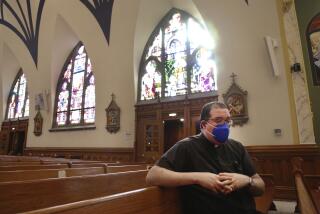Some Surprises Turn Up in New Presbyterian Survey
- Share via
A recent survey undertaken by the Presbyterian Church (U.S.A.) may have overturned some assumptions about conservatives and liberals in the denomination and about what is on the minds of ministers and lay people.
According to the study, in the Presbyterian Church just 5% of the clergy and 16% of the laity say the Bible should be taken literally--not surprising, perhaps, for a church considered to be among the most liberal Protestant denominations in the country.
However, other results contained in a recent survey of 3,907 clergy and laity underscores the difficulties inherent in use of terms such as “liberal” and “conservative” to describe a denomination as large with as many as 3 million members.
For example, the survey shows that only one-third of the clergy and a scant 11% of the laity consider themselves “somewhat liberal.” About 40% of the laity and 15% of the clergy see themselves as “somewhat conservative.” About a third of all respondents classified themselves as political moderates.
Labels Don’t Stick
If the labels do not always stick, neither, apparently, do traditional caricatures of preachers and churchgoers. The survey showed that panelists do not spend much time thinking about heaven or hell, with clergy thinking about those subjects less than the laity.
In another category that clearly surprised the survey takers, less than half the clergy and 22% of the laity in the Louisville-based denomination say they consider working to bring about social justice “very important.”
The recent survey was the first of participants in the denomination’s fifth Presbyterian Panel, scientifically selected groups of clergy and laity who agree to participate in a series of surveys over three-year periods.
The first panel was selected in 1973, 10 years before the merger of the major northern and southern Presbyterian denominations to form the Presbyterian Church (U.S.A.).
The recent survey is considered a “background report” for the 1988-90 panel, focusing on demographic data and information relating to basic religious background and beliefs.
Although the social justice question received a “very important” rating from less than half of the clergy and laity, responses were much higher to the question of “helping others who are in need.” It was viewed as “very important” by over three-quarters of the clergy and almost two-thirds of the laity. The relatively wide gap of about 20% between clergy and laity responses on both questions, framers of the survey noted, “are not too surprising” because “there have always been lay-clergy differences.”
What was surprising, the survey report noted, was that many more lay panelists did not rate “helping others in need” higher. The survey writers say they expected a higher response because the question directly followed one about “trying to lead a good Christian life.”
“A reasonable assumption is that if one asks people about helping others after asking them about leading a good Christian life, it would tend to increase the percentage who say it’s important to help others,” the report says.
On the question of attitudes toward persons who have not heard of Christ, over three-fourths of all panelists say they agree with the statement: “I do not believe they will be damned, but I do have a desire to share the love of Christ with them.”
The report says there are “significant differences” among panelists in views toward prayer, where 72% of the pastors but only 47% of the lay members agree that “prayer is talking with God, and God always answers.”
In the area of religious experiences, 77% of church members and 84% of the elders--lay office holders in the church--say they had felt the presence of God, with a slightly smaller percentage reporting that they had felt the presence of the Holy Spirit.
More to Read
Sign up for Essential California
The most important California stories and recommendations in your inbox every morning.
You may occasionally receive promotional content from the Los Angeles Times.













